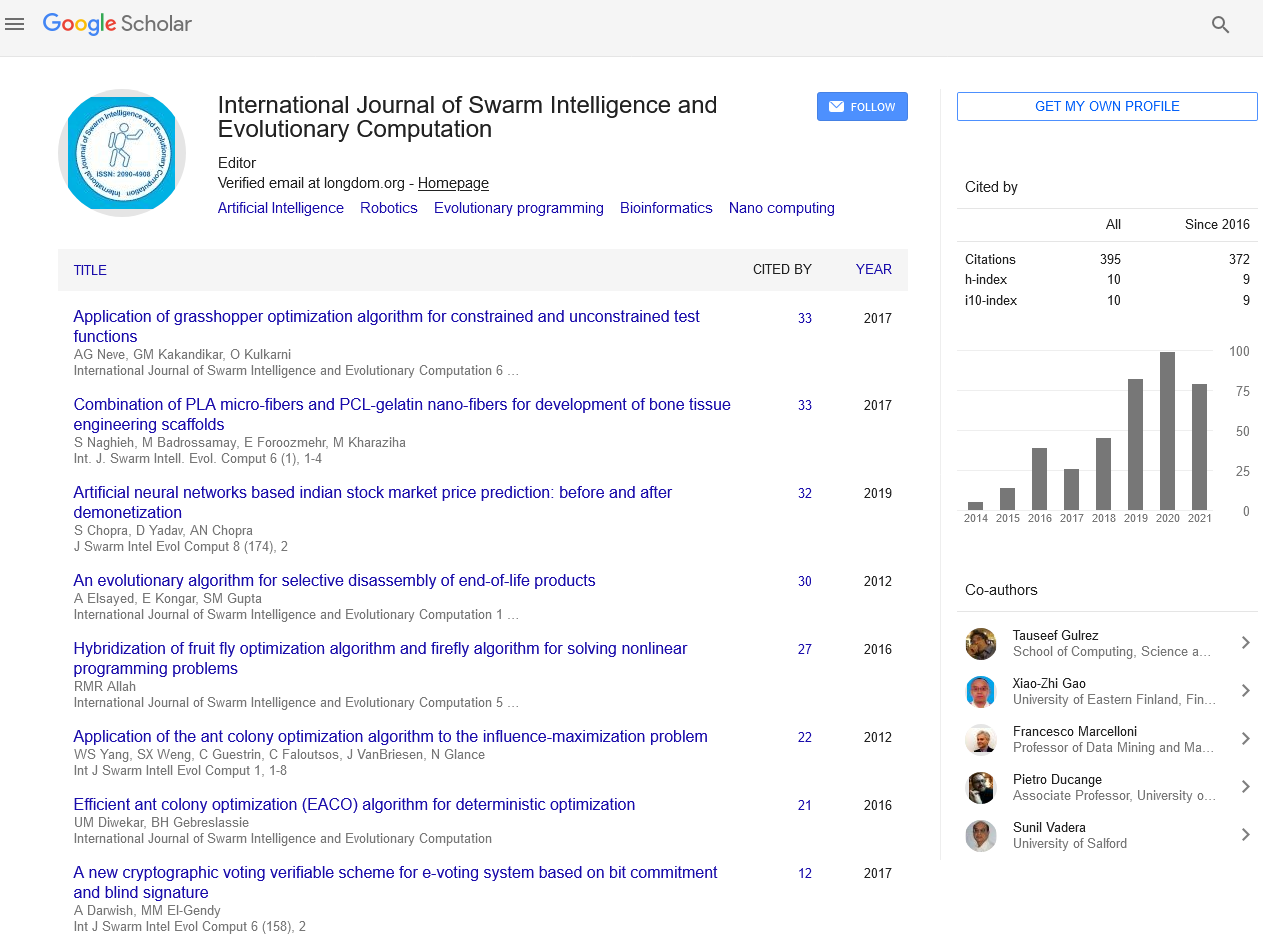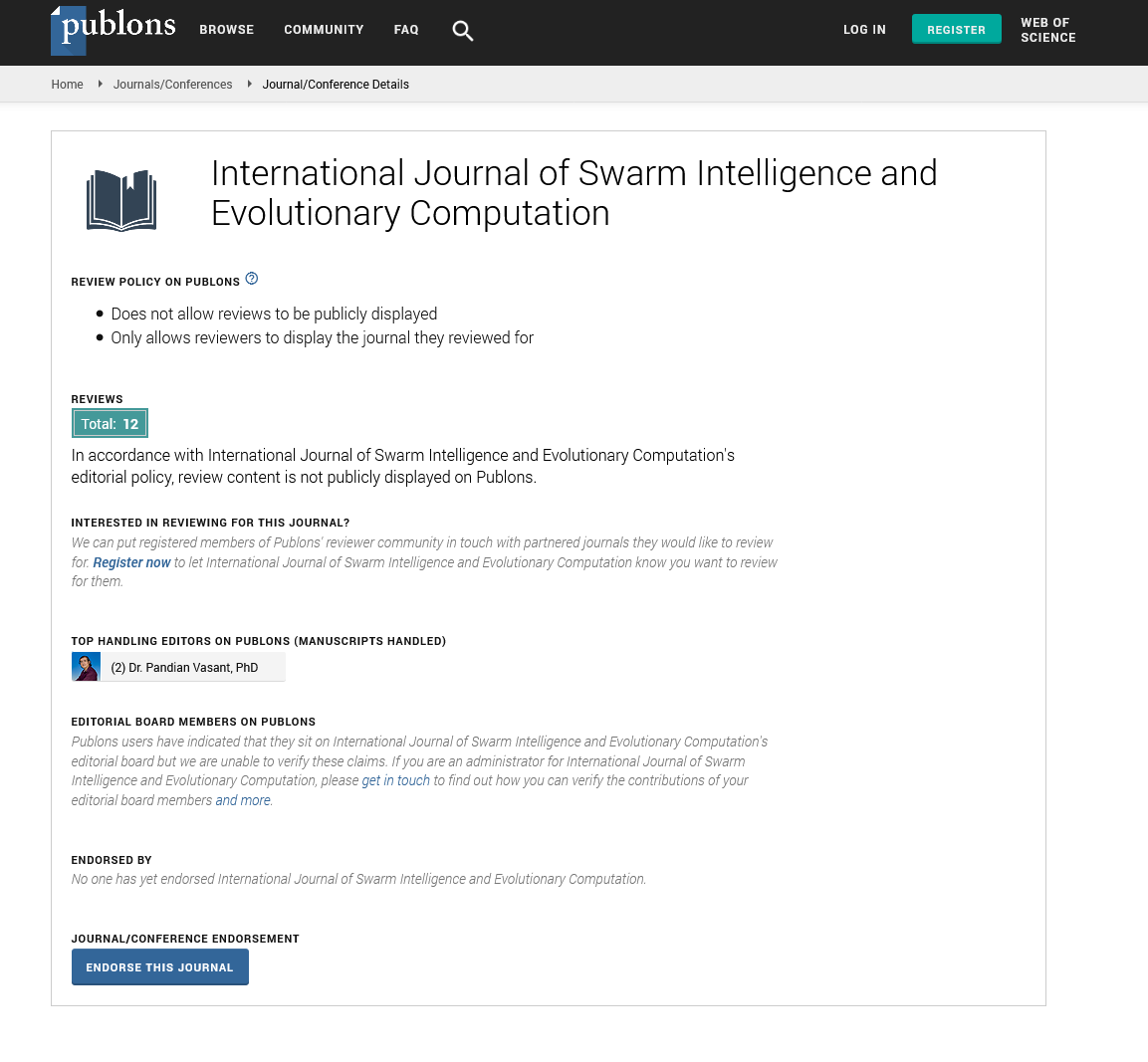Indexed In
- Genamics JournalSeek
- RefSeek
- Hamdard University
- EBSCO A-Z
- OCLC- WorldCat
- Publons
- Euro Pub
- Google Scholar
Useful Links
Share This Page
Journal Flyer

Open Access Journals
- Agri and Aquaculture
- Biochemistry
- Bioinformatics & Systems Biology
- Business & Management
- Chemistry
- Clinical Sciences
- Engineering
- Food & Nutrition
- General Science
- Genetics & Molecular Biology
- Immunology & Microbiology
- Medical Sciences
- Neuroscience & Psychology
- Nursing & Health Care
- Pharmaceutical Sciences
Opinion Article - (2024) Volume 13, Issue 1
Knowledge Modelling: Bridging Theory to Practice in Information Management
Simon Riffle*Received: 03-Jan-2024, Manuscript No. SIEC-24-24957; Editor assigned: 05-Jan-2024, Pre QC No. SIEC-24-24957 (PQ); Reviewed: 19-Jan-2024, QC No. SIEC-24-24957; Revised: 26-Jan-2024, Manuscript No. SIEC-24-24957 (R); Published: 05-Feb-2024, DOI: 10.35248/2090-4908.24.13.353
Description
Knowledge modelling serves as a cornerstone in capturing, organizing, and leveraging information for decision-making, problem-solving, and innovation across various domains. In today's knowledge-driven society, the ability to capture, manage, and utilize information effectively is paramount for organizations and individuals alike. Knowledge modelling, as a discipline, focuses on structuring and formalizing knowledge in a way that facilitates understanding, reasoning, and application. It encompasses various methodologies, techniques, and tools aimed at representing knowledge in a systematic and computationally interpretable manner.
Theoretical foundations of knowledge modelling
Knowledge representation: Knowledge representation involves the encoding of knowledge in a form that can be interpreted and manipulated by computational systems. Various approaches to knowledge representation include logical formalisms, semantic networks, frames, and ontologies. The choice of representation depends on the nature of the domain and the intended application.
Ontology development: Ontologies are formal specifications of concepts, relationships, and axioms within a specific domain. They provide a structured framework for organizing knowledge and defining the semantics of domain concepts. Ontology development typically involves ontology engineering processes such as conceptualization, formalization, implementation, and evaluation.
Semantic technologies: Semantic technologies enable the semantic annotation, integration, and reasoning over structured knowledge resources. They leverage formal semantics to facilitate interoperability, discovery, and inference across heterogeneous data sources. Semantic technologies include standards such as RDF (Resource Description Framework), OWL (Web Ontology Language), and SPARQL (SPARQL Protocol and RDF Query Language).
Methodologies of knowledge modelling
Top-down modelling: In top-down modelling, knowledge is modeled based on predefined concepts and relationships derived from domain experts or existing ontologies. This approach is often used in structured domains where the domain knowledge is well-understood and stable.
Bottom-up modelling: Bottom-up modelling involves extracting knowledge from data using techniques such as data mining, machine learning, and natural language processing. The extracted knowledge is then structured and formalized into ontologies or knowledge graphs. This approach is suitable for domains with large volumes of unstructured or semi-structured data.
Hybrid modelling: Hybrid modelling combines top-down and bottom-up approaches to leverage the strengths of both methodologies. It allows for the integration of domain expertise with data-driven insights, enabling a more comprehensive and accurate representation of knowledge.
Applications of knowledge modelling
Healthcare informatics: Knowledge modelling is extensively used in healthcare informatics for clinical decision support, disease diagnosis, treatment recommendation, and patient monitoring. Ontologies such as SNOMED CT (Systematized Nomenclature of Medicine Clinical Terms) and HL7 FHIR (Fast Healthcare Interoperability Resources) facilitate semantic interoperability and knowledge sharing among healthcare systems.
Financial services: In the financial services industry, knowledge modelling aids in risk assessment, fraud detection, portfolio management, and algorithmic trading. Ontologies and semantic technologies enable the integration of heterogeneous financial data sources, regulatory compliance, and real-time analytics.
Manufacturing and engineering: Knowledge modelling plays an important role in manufacturing and engineering domains for product lifecycle management, supply chain optimization, and predictive maintenance. Ontologies help in standardizing product specifications, process definitions, and equipment interoperability, thereby improving efficiency and reducing costs.
Education and e-learning: In education, knowledge modelling supports personalized learning, curriculum development, and competency assessment. Ontologies and learning analytics techniques enable the adaptive delivery of educational content, learner profiling, and performance evaluation based on individual needs and preferences.
Challenges and future directions
Despite the advancements in knowledge modelling, several challenges persist, including ontology alignment, knowledge acquisition, scalability, and usability. Future research directions may focus on addressing these challenges through innovative methodologies, tools, and standards. Additionally, emerging trends such as explainable AI, knowledge graphs, and knowledge-centric AI systems offer new opportunities for advancing knowledge modelling capabilities.
Conclusion
Knowledge modelling serves as a foundational pillar in harnessing the power of information for decision-making, innovation, and problem-solving. By providing a structured framework for representing and organizing knowledge, it enables individuals and organizations to navigate complex domains, extract actionable insights, and drive meaningful outcomes. As technology continues to evolve, the importance of knowledge modelling in shaping the future of various industries and domains cannot be overstated. Through continued research, collaboration, and innovation, knowledge modelling will continue to play a pivotal role in shaping the digital landscape and empowering individuals and organizations to thrive in an increasingly knowledge-intensive world.
Citation: Riffle S (2024) Knowledge Modelling: Bridging Theory to Practice in Information Management. Int J Swarm Evol Comput. 13:353.
Copyright: © 2024 Riffle S. This is an open-access article distributed under the terms of the Creative Commons Attribution License, which permits unrestricted use, distribution, and reproduction in any medium, provided the original author and source are credited.


